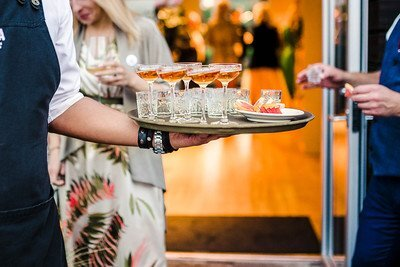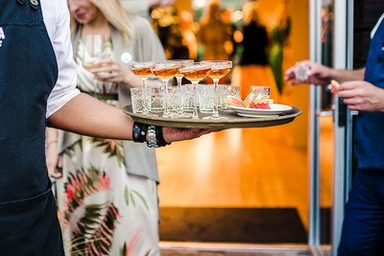The idea of ditching an online internship for an in-person job this summer sounded like a dream in this (almost) post-pandemic world. Not to mention, this serving job was at a restaurant seen on numerous “Toronto’s Hottest Places” or “Toronto’s Best Restaurants” lists, which only made it more enticing. Toronto is a city home to some of the biggest singers, rappers, producers and athletes in the game, and to be young and living in the city is therefore an experience on its own. Now, consider the idea of working at a hotspot where Toronto-born stars are notoriously known for hanging out, and the job sounds too good to be true.
Though the expectations I harboured of serving alongside girls who would become close friends, meeting celebrities, and being part of a team I loved were met, the process of getting there was nothing short of brutal from the get-go. For starters, the training to even become a server was intense. In addition to needing a license to serve alcohol, I also needed one to prove that I knew the restaurant’s menu and protocols. Honestly, I studied harder to pass the licensing exam than I did for any psychology assignment in my first year.
By the time my first day rolled around, the anticipation of putting on my uniform – an all-black dress, heels, and chunky belt – was almost too much to bear. Not only was the restaurant publicly known for having a star-studded guestlist on the weekends, it was also privately known to locals for having exceptional service and beautiful staff. To be a part of what management called the ‘show’ felt like both a compliment and an accomplishment; “we see something unique and beautiful in your ability to connect with people,” my boss told me after my first shift. I was delighted to be there.
In hindsight, the hardest elements of serving rarely came from within the company itself. Though the environment was competitive, the restaurant was successful and the managers truly made it known that we had a part in that success. What made the job grueling was the public, and not just in a difficult-customer-type-of-way, but in the treatment and judgement they constantly threw at us. There were two groups in the ‘House’: the ‘Back of House’, which was composed of male chefs and kitchen staff, and the ‘Front of House’, made up of female hostesses and servers. Besides the obvious workplace roles, gender was the unspoken differentiator between us; the elephant in the room. The rigid gender roles in the restaurant were never addressed by the managers, but were instead a source of frequent jokes for myself and my team. Back of House teased us as we walked onto the floor, “beauty sells, ladies!” they would say, and we would laugh as we split off to our respective parts of the machine. Sure, we joked about the imbalance and backwardness of the way the place was run, but it was respectful and lighthearted when it came from within the team. It was when it was brought up externally that the joke died.
The focus of the restaurant was to go above and beyond in making sure every guest had an incredible experience and was left wanting to come back. I was naïve going into the industry, and so I was shocked when I learnt the plethora of ways in which the company’s motto could be interpreted. For example, it was viewed as normal and almost expected to flirt with tables and create a ‘fun’ experience for them. One could argue that this sets a certain tone, but I would counter that there are no justifications for some of the intrusive requests we received. On numerous occasions, girls were asked to take part in provocative photo-ops, to sneak tequila shots with tables, or to sit on the laps of men with wedding rings on their fingers.
Once, a restaurant critic came in and wrote a review about us. When the article was published, the critic spoke about the pressures of the demanding, fast-paced environment for the chefs in the kitchen, how hard they worked, and their incredible product execution. While this is all valid, it was also true for everyone who had a part in the process. When mentioning the Front of House, the critic referred to us as ‘the most beautiful girls in the city’. There was no mention of our work ethic, constant movement, stellar communication, or quality of service. It felt like a slap in the face, and completely disregarded the work the team put in every day. Honestly, it was the first time I had experienced blatant sexism. I would have loved to see the men who shared this view stand on heels for nine-hour shifts. I wondered how they would deal with inappropriate behaviour from grown men at the bar, guests sneaking pictures or videos of them, or being followed home by guys who just couldn’t take ‘no’ for an answer. All things myself and the other girls dealt with far too often.
I’ll be forever grateful to have worked in the restaurant industry. It was a place where I felt the skills I learned could truly be transferable to any future job I might have. That said, it is frustrating and depressing to have learned that even the most prominent workplaces are bastions of serious sexism brought in by the public. My time working as a server really opened my eyes to where the world is currently when it comes to basic respect for girls and young women, and how much work we have left to do.


